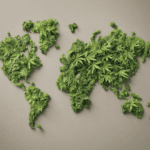Introduction
Cannabidiol, commonly known as CBD, has seen a dramatic rise in popularity over the last decade. This non-psychoactive compound derived from the cannabis plant has been touted for its potential health benefits, ranging from pain relief to anxiety reduction. However, the legal landscape surrounding CBD remains complex and varied across the globe. This article delves into the evolution of CBD regulations from a global perspective, examining how different countries have approached the legality, commercialization, and use of CBD.
The Early Days of CBD Regulation
The Origins of CBD and Cannabis Regulation
CBD is one of over 100 cannabinoids found in the cannabis plant. Historically, cannabis has been used for medicinal purposes in various cultures for thousands of years. However, the early 20th century saw a global shift towards the criminalization of cannabis, largely due to concerns over its psychoactive component, THC (tetrahydrocannabinol). This wave of prohibition did not differentiate between CBD and THC, leading to a blanket ban on all cannabis-derived products.
The 1990s – A Turning Point
The 1990s marked a significant turning point in the perception and regulation of CBD. Scientific research began to uncover the potential therapeutic benefits of CBD, distinct from the psychoactive effects of THC. In 1996, California became the first U.S. state to legalize medical cannabis, paving the way for the reintroduction of cannabis-based treatments, including CBD, into mainstream medicine.


The Legalization Movement
North America
The United States
The United States has been at the forefront of the CBD legalization movement. The 2018 Farm Bill was a landmark piece of legislation that legalized the cultivation of industrial hemp (defined as cannabis with less than 0.3% THC) and the production of CBD derived from it. This effectively made CBD legal at the federal level, though individual states still retain the power to regulate or restrict its use.
However, the U.S. Food and Drug Administration (FDA) maintains that CBD cannot be marketed as a dietary supplement or added to food and beverages without its approval. This has led to a patchwork of state regulations and ongoing legal challenges.
Canada
Canada legalized recreational cannabis in 2018, which includes CBD products. The Canadian government regulates CBD under the Cannabis Act, allowing for the sale of CBD products through licensed retailers. However, strict regulations govern the production, distribution, and sale of CBD, ensuring product safety and quality.
Europe
The European Union
The European Union (EU) has taken a cautious approach to CBD regulation. In 2020, the European Court of Justice ruled that CBD is not a narcotic, and therefore, EU member states cannot ban its import or sale. However, the regulatory framework for CBD varies widely across EU countries. Some countries, like Germany and the Netherlands, have embraced CBD, allowing for its sale in various forms, while others maintain stricter controls.
The United Kingdom
The United Kingdom has seen rapid growth in the CBD market since it left the EU. In 2021, the UK’s Food Standards Agency (FSA) required that all CBD products be submitted for approval under the novel food regulation, ensuring that products are safe for consumption. Despite the regulatory hurdles, the UK remains one of the largest markets for CBD in Europe.
Asia
China
China, one of the world’s largest producers of industrial hemp, has a complex relationship with CBD. While the cultivation of hemp is legal in certain provinces, the use of CBD in cosmetics and food is heavily restricted. However, the Chinese government has shown interest in the economic potential of CBD, leading to a gradual loosening of restrictions.
Japan
Japan has one of the most conservative approaches to cannabis and CBD in Asia. While CBD is legal, THC is strictly prohibited. This has led to a niche market for THC-free CBD products, which are imported from abroad or produced domestically under stringent regulations.
India
India’s approach to CBD is evolving. Although cannabis is illegal under the Narcotic Drugs and Psychotropic Substances Act of 1985, the country’s ancient Ayurvedic practices have long utilized cannabis for medicinal purposes. In recent years, India has begun to explore the commercialization of CBD, with a focus on its potential as a wellness product.
Emerging Markets and Regulatory Challenges
Latin America
Latin America has emerged as a significant player in the global CBD market, with countries like Uruguay and Colombia leading the way. Uruguay was the first country in the world to fully legalize cannabis, including CBD, in 2013. Colombia, with its favorable climate for cannabis cultivation, has also embraced the CBD industry, establishing a regulatory framework for the production and export of CBD products.
Africa
Africa presents a mixed picture when it comes to CBD regulation. South Africa became the first African country to legalize CBD in 2019, allowing for the sale of low-THC CBD products. However, in many other African countries, CBD remains illegal or highly restricted, despite the continent’s long history of cannabis cultivation.
Australia and New Zealand
Australia and New Zealand have taken cautious steps towards CBD legalization. In Australia, low-dose CBD was legalized for over-the-counter sales in 2021, though products must meet strict safety standards. New Zealand allows for the use of CBD as a prescription medicine, but over-the-counter sales are not yet permitted.
The Future of CBD Regulation
Global Harmonization
The global CBD market is projected to continue its rapid growth, with increasing pressure on governments to harmonize regulations. International organizations, such as the World Health Organization (WHO), have recognized the therapeutic potential of CBD and called for its rescheduling under international drug treaties. This could pave the way for more uniform global standards.
Consumer Protection and Safety
As the CBD market expands, consumer protection and safety will remain paramount. Governments are likely to implement stricter regulations on product labeling, quality control, and advertising to protect consumers from false claims and unsafe products. Ensuring that consumers have access to accurate information about the benefits and risks of CBD will be a key challenge for regulators.
Innovation and Research
The future of CBD regulation will also be shaped by ongoing research into its therapeutic potential. As more clinical trials are conducted and new applications for CBD are discovered, regulators will need to adapt to accommodate these developments. This could lead to the approval of new CBD-based medications and a broader acceptance of CBD as a legitimate therapeutic option.
Conclusion
The evolution of CBD regulations reflects the complex and rapidly changing landscape of cannabis law around the world. While significant progress has been made in recognizing the potential benefits of CBD, the regulatory framework remains fragmented and inconsistent. As the global CBD market continues to grow, it is likely that we will see further developments in the harmonization of regulations, increased consumer protection, and a greater emphasis on research and innovation.






